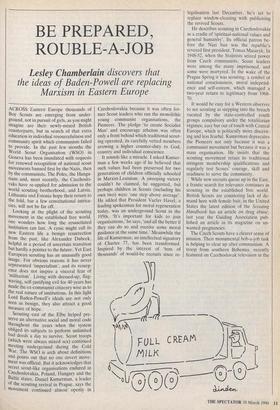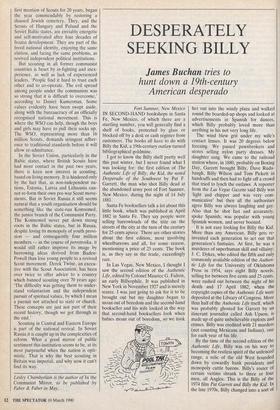BE PREPARED ,
ROUBLE-A-JOB
Lesley Chamberlain discovers that
the ideas of Baden-Powell are replacing Marxism in Eastern Europe
ACROSS Eastern Europe thousands of Boy Scouts are emerging from under- ground, not in pursuit of girls, as you might imagine are their newly-mixed British counterparts, but in search of that extra education in individual resourcefulness and community spirit which communism failed to provide. In the past few months the World Scout Organisation (WSO) in. Geneva has been inundated with requests for renewed recognition of national scout movements banned first by the Nazis, then by the communists. The Poles, the Hunga- rians and, most recently, the Czechoslo- vaks have re-applied for admission to the world scouting brotherhood, and Latvia, Lithuania and Estonia hope their return to the fold, bar a few constitutional intrica- cies, will not he far off.
Looking at the plight of the scouting movement in the established free world, one wonders how long the resuscitated institution can last. A cynic might call its new Eastern life a benign resurrection from the past, like Alexander Dubcek, helpful in a period of uncertain transition but hardly a pointer to the future. Yet East European scouting has an unusually good image. For obvious reasons it has never represented 'imperialism', and its resurg- ence does not inspire a visceral fear of `militarism'. Living with dressed-up, flag- waving, self-justifying evil for 40 years has made the ex-communist citizenry wise as to the real nature of institutions. In this light Lord Baden-Powell's ideals are not only seen as benign, they also attract a good measure of hope. Scouting east of the Elbe helped pre- serve an alternative social and moral code throughout the years when the system obliged its subjects to perform unlimited bad deeds a day to survive. Scout troops (which were always mixed sex) continued meeting underground during the Cold War. The WSO is arch about definitions and points out that no one covert move- ment was official. But it acknowledges that secret scout-like organisations endured in Czechoslovakia, Poland, Hungary and the Baltic states. Daniel Kumerman, a leader of the scouting revival in Prague, says the movement continued almost openly in Czechoslovakia because it was often for- mer Scout leaders who ran the monolithic young communist organisations, the Pioneers. The pledge `to create Socialist Man' and encourage atheism was often only a front behind which traditional scout- ing operated, its carefully vetted members avowing a higher counter-duty to God, country and individual conscience.
It sounds like a miracle. I asked Kumer- man a few weeks ago if he believed that such values had been preserved for two generations of children officially schooled in Marxist-Leninism. A sweeping victory couldn't be claimed, he suggested, but perhaps children in Scouts (including his own two) were 'one step above average'. He added that President Vaclav Havel, a leading spokesman for moral regeneration today, was an underground Scout in the 1950s. 'It's important for kids to join organisations,' he says, 'and all the better if they can do so and receive some moral guidance at the same time.' Meanwhile the life of Kumerman, an intellectual signatory of Charter 77, has been transformed. Inspired by the interest of 'tens of thousands' of would-be recruits since re- legalisation last December, he's set to replace window-cleaning with publicising the revived Scouts.
He describes scouting in Czechoslovakia as a cradle of 'spiritual-national values and general humanity'. Its official patron be- fore the Nazi ban was the republic's revered first president, Tomas Masaryk. In 1948-52, when the Stalinists seized power from Czech communists, Scout leaders were among the many imprisoned, and some were martyred. In the wake of the Prague Spring it was scouting, a symbol of national consciousness, moral independ- ence and self-esteem, which managed a two-year return to legitimacy from 1968- 70.
It would be easy for a Western observer to see scouting as stepping into the breach vacated by the state-controlled youth groups compulsory under the totalitarian regimes; easy but out of touch with Central Europe, which is politically more discern- ing and less fearful. Kumerman deprecates the Pioneers not only because it was a communist movement but because it was a mass organisation. He insists that the scouting movement retain its traditional stringent membership qualifications and regularly test Scouts' courage, skill and readiness to serve the community.
While new recruits queue up in the East, a frantic search for relevance continues in scouting in the established free world. British Scouts are countering lack of de- mand here with female bait; in the United States the latest edition of the Scouting Handbook has an article on drug abuse; last year the Guiding Association pub- lished an article in its magazine on un- wanted pregnancies.
The Czech Scouts have a clearer sense of mission. Their monumental bob-a-job task is helping to clear up after communism. A troop from southern Bohemia, recently featured on Czechoslovak television in the first mention of Scouts for .20 years, began the year commendably by restoring a disused Jewish cemetery. They, and the Scouts of Hungary and Poland and the Soviet Baltic states, are enviably energetic and self-motivated after four decades of frozen development. They are part of the freed national identity, enjoying the same elation, and facing the same problems, as revived independent political institutions.
But scouting in all former communist countries is beset by in-fighting and inex- perience, as well as lack of experienced leaders. People find it hard to trust each other and to co-operate. The evil spread among people under the communists was so strong that it is difficult to overcome,' according to Daniel Kumerman. Some values evidently have been swept aside, along with the bureaucracy of an officially recognised national movement. This is where the WSO can help, though the boys and girls may have to pull their socks up. The WSO, representing more than 16 million Scouts, demands stringent adher- ence to traditional standards before it will allow re-admittance.
In the Soviet Union, particularly in the Baltic states, where British Scouts have had most contact in the past two years, there is keen new interest in scouting, based on living memory. It is hindered only by the fact that, as non-independent na- tions, Estonia, Latvia and Lithuania can- not re-form their own pre-war Scout move- ments. But in Soviet Russia .it still seems natural that a youth organisation should be something like the state-run Komsomol, the junior branch of the Communist Party. The Komsomol never put down strong roots in the Baltic states, but in Russia, despite losing its monopoly of youth provi- sion — and consequently four million members — in the course of perestroika, it would still rather improve its image by borrowing ideas derived from Baden- Powell than lose young people to a revived Scout movement. Derek Twine, an execu- tive with the Scout Association, has been over twice to offer advice to a country which banned scouting over 70 years ago: `The difficulty was getting them to under- stand voluntarism and the independent pursuit of spiritual values, by which I mean a pursuit not attached to state or church. These concepts are just not part of their recent history, though we got through in the end.'
Scouting in Central and Eastern Europe is part of the national revival, In Soviet Russia it is caught up in the complexities of reform. What a good mirror of public sentiment this institution seems to be, at its most purposeful when the nation is opti- mistic. That is why the best scouting in Britain was imperial, and why now it can't find its way.
Lesley Chamberlain is the author of In the Communist Mirror, to be published by Faber & Faber in May.



























































 Previous page
Previous page